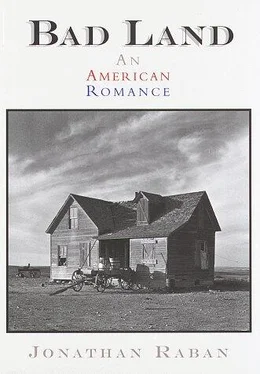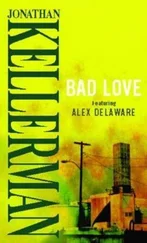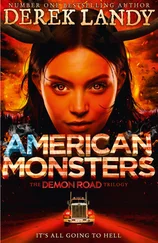I took my figures from a man who had done all these jobs, and worked alongside the migrants in the orchards in the 1930s. Bruce Mitchell was the town historian — a nonagenarian in roaring good form. With his portable oxygen supply at his elbow, he sat in his long, picture-windowed living room overlooking the darkened river, and delivered to me, in a rolling, musical baritone, a first-rate lecture on Wenatchee in the Depression.
He talked of how the good people of Wenatchee lived in a society so formal and stratified that residents of the few blocks in the town center would not condescend to recognize the existence of the below-the-salt north- and south-enders. The migrant workers were viewed as a subhuman breed. “These people thought that any kind of manual labor was unclean.”
To the Wenatcheeites, the Okies were the alien unwashed. “Now, you’ve heard of Oklahoma?” Mitchell boomed at me.
“Well, yes — of course …”
He threw his head back, and continued.
“Now, you’ve heard of Oklahoma, where they never have the blues — Where the bandits steal the jitneys, and the marshals steal the booze, Where they always hang the jury, but they never hang the man, And if you call a man a liar, you get home as best you can; Where the wise owls are afraid to hoot, and the birds don’t dare to sing … For it’s hell in Oklahoma, where they all shoot on the wing.” Mitchell took in a deep indraught of breath. “ That was Oklahoma,” he said. “And you know what to call the bit of hose they use to siphon gas out of your car? An Arkansas credit card.”
Mitchell’s wife shuffled silently in and out of the room as he declaimed — checking on his oxygen level.
For the homesteaders, who still thought of themselves as proud freeholders, with title to their own half-square-mile of America, the camps at Wenatchee were a long humiliation, grimly borne, and the snobbery of the town kept them perpetually aware of just how far they’d fallen.
In her 1964 memoir, Reapers of the Dust: A Prairie Chronicle , Lois Phillips Hudson described how it was to be a child in the camps. Her family had homesteaded in North Dakota; in 1937, “with our mouths, nostrils and eyes full of the dust blowing from our bare fields,” they sold up, loaded the car, and “drove West to find water and survival.” They reached Wenatchee. Hudson, aged ten, was jeered at in the school yard when she tried to tell her classmates that she was from North Dakota. A boy told her: “We’re Okies. That’s what you are too.”
I didn’t yet know that it was disgraceful and dirty to be a transient laborer and ridiculous to be from North Dakota. I thought living in a tent was more fun than living in a house. I didn’t know that we were gypsies, really (how that thought would have thrilled me then!), and that we were regarded with the suspicion felt by those who plant toward those who do not plant. It didn’t occur to me that we were all looked upon as one more of the untrustworthy natural phenomena, drifting here and there like mists or winds, that farmers of certain crops are forced to rely on. I did not know that school administrators and civic leaders held conferences to talk about the problem of transient laborers.
Yet people did manage to escape the camps. Some ex-homesteaders raised loans to buy a three- or five-acre orchard for themselves. Their children are growing apples in Wenatchee now. Some got a patch of land on the shore of Lake Chelan, built a row of cabins there, and opened a resort. Some — like the Hudson family — returned to their car, and continued westward, over the Cascade mountains, to Seattle.
During the night, the advancing front of a warm Pacific storm system slid under the drift of polar air that had brought premature winter to the Northwest. The temperature was rocketing. At 6 a.m. the TV weatherman was forecasting 59° for Seattle by noon. The mountain passes, for which snow alerts had been issued the previous evening, were now clear.
Route 2, to Stevens Pass, was streaming like a mountain brook. All the snow in the Cascades was melting, and more rain was falling. I had always known that this westward journey was a quest for moisture; I hadn’t counted on an outcome so embarrassingly profuse in its success. In the dank half-light of the forest, moisture dripped and splashed and puddled. The windshield wipers on the car couldn’t keep up with it. The cloud ceiling, which had grazed the taller buildings of Wenatchee, had been left far below; toiling round the corkscrew bends, the Jeep was way up in the clouds.
A dozen miles short of the pass, a big Douglas fir, unable to bear the weight of sodden snow in its branches, had fallen across the road. The upper half of the tree had shattered over the left-hand lane. An eastbound pickup was stopped just short of the casualty, and two men were trying to shift sufficient debris from the road to clear a passage through. I joined them. It was bracing early-morning work, scooping up armfuls of still-frozen foliage, and hauling away the powerfully scented logs into which the tree had conveniently broken. The drenching rain, the invigorating, aftershave smell, and the unaccustomed exercise put me in a high good humor. I enjoyed the company; both men, pushing seventy, spoke in the voices of Appalachian Kentucky or Tennessee. It was a common accent here; in the 1930s, whole towns of unemployed miners had come to settle in the foothills of the Cascades. We grunted amiably at each other as we worked. We were nearly through, when one of the men stared long and hard at the Jeep — about which I had grown daily more self-conscious during the drive.
“You wouldn’t, by any chance, have a say-ellulah telephone in that … rig, of yours?”
“Actually—”
“Call 9-1-1, ask for highways emergency. Get them on the case, and put some tax dollars to work.”
I did as I was bidden, and resolved to sell the Jeep. If I wanted to go incognito around here, I needed an ’89 Chevy pickup with a broken tailgate, and something brown and furry to dangle from the rearview.
Beyond the pass, the Skykomish River was a torrent of boiling cappuccino. Rafts of smashed timber were collecting in the eddies, and tree-sized logs cartwheeling in the turbulence. A Seattle radio station was broadcasting flood alerts for the Skagit, the Stillaguamish, the Skykomish, the Snoqualmie, the Snohomish, the Tolt, the Green, the Cedar … And still the rain kept falling, in vertical bars that turned icing-sugar-white as they hit the road. A duck hunter was reported lost in the Snoqualmie. By the time I reached Sultan and Monroe, the Skykomish had burst its banks, and the lower-level streets had turned into canals.
The deluge of snowmelt and rain was extravagantly fitting. Seattle had always been the wet capital of a dry country. Its magnetic field stretched far back, over the Rocky Mountains, across the whole length of Montana, even into the Dakotas. I’d felt it in Marmarth and on Merle Clark’s North Dakota ranch. Minneapolis was a lot closer on the map than Seattle, but it was “back east”; you had to climb to it, against the cultural tilt of the West. Seattle was a western city — the highway and the railroad ended there, and it was to Seattle that people looked, for jobs, for higher education, for major-league ball games, for a chance at a renewed life when the prairie finally dried up on you.
For the homesteaders, Seattle meant jobs. There was work to be had in the shipyards and on the docks. For Art Worsell, there was the Seattle-based Alaskan fishing fleet. He found employment as a deckhand. When the United States entered the war in 1941, there were factory jobs at the Boeing plant. People could fail, and fail again, on their way west — and still hope to find a living here in western Washington.
Читать дальше












